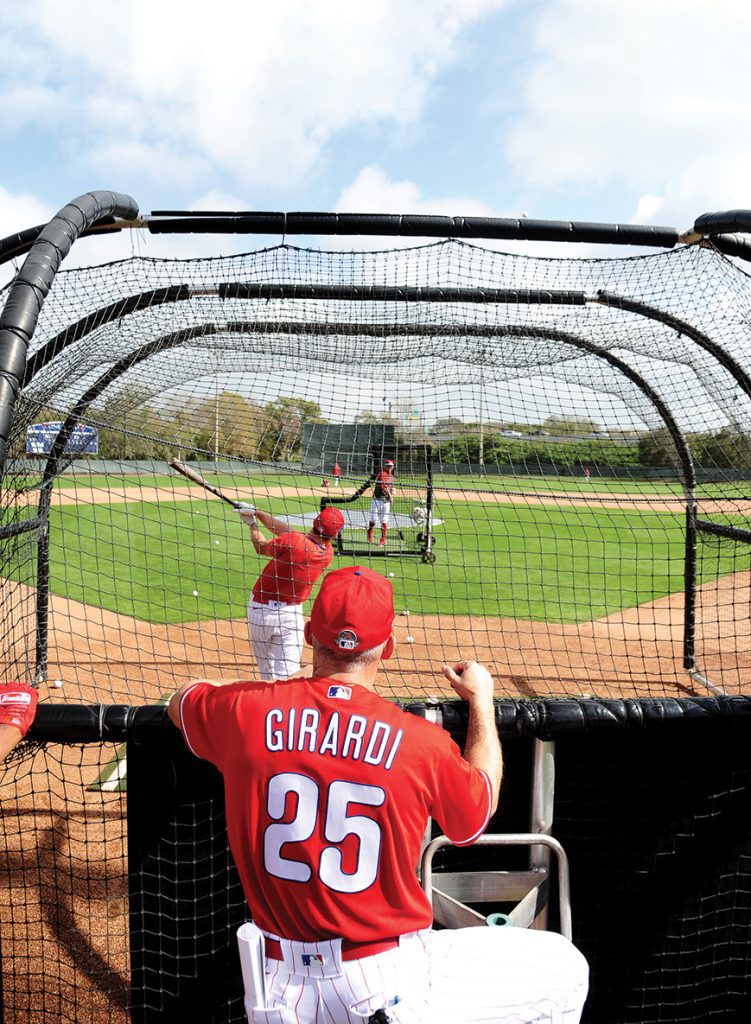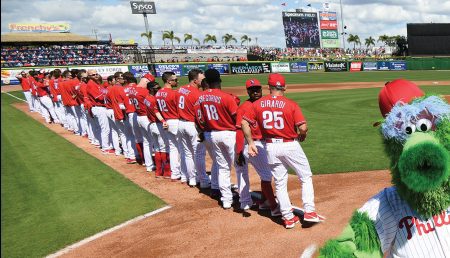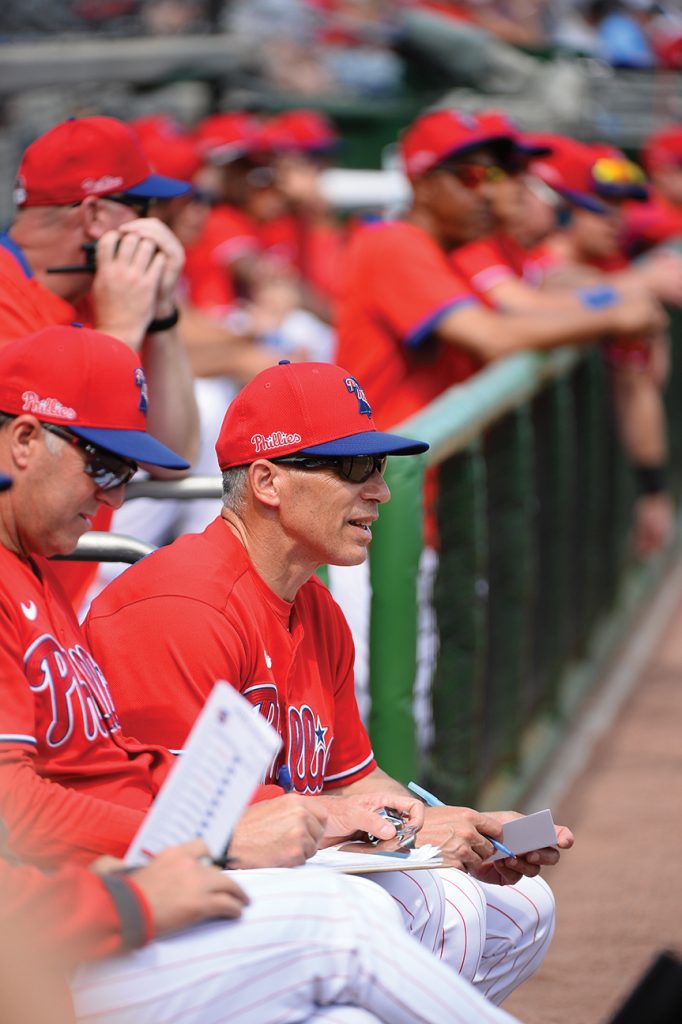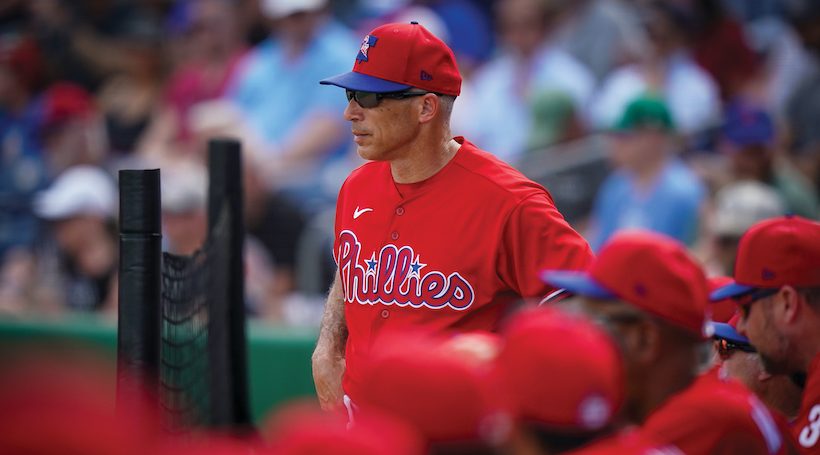Just before SJ Magazine went to press, Major League Baseball ended Spring Training. No one is sure when the season will begin. But we are sure that when that first pitch is thrown, it will be a truly wonderful day.
No matter how upside-down life seems to get, many people will tell you there is one thing in life you can count on to make you feel like life really does go on: baseball. Considered America’s favorite pastime for decades, the old-school game is exactly what we need right now. We all need a reason to let out a giant sigh, get together with friends, and then laugh and cheer. And while he may not know exactly when, Joe Girardi plans on giving us exactly that.
—–
Photography by Miles Kennedy
—–
If the Phillies could have custom designed a manager for the 2020 edition of their baseball team, the result would probably look a lot like Joe Girardi.
The 55-year-old Girardi is a straight-shooting, hard-working guy with a 35-year baseball resume that includes two World Series victories, one as a player and one as a manager. That he’s an Italian-American whose three non-baseball passions are family, faith and food only adds to his made-for-this-team status. He definitely seems to be the perfect guy to take on the task of ending the Phillies’ 10-season (and counting) drought of World Series appearances.
If there’s a box he doesn’t check, well, that’s no fault of his own. He hails from Peoria, Ill., a city long stereotyped as boring, mid-western “flyover” turf. But Girardi has picked up plenty of city smarts. After all, he had a 10-season run leading the New York Yankees to three AL East titles and six postseason appearances, including the 2009 World Series win over the Phillies. There’s a case to be made that Girardi is the embodiment of what Frank Sinatra said about New York when he sang, “If you can make it there, you can make it anywhere.”

And now it’s his turn to jumpstart a Philly team that failed to live up to high expectations, even after last year’s arrival of Bryce Harper, J.T. Realmuto and other high-profile players. The Phillies’ 55th manager in the team’s checkered 137-year history is nothing if not revved up by the prospect of giving the city another world championship.
“I’m well aware of the passion for the game of baseball here,” Girardi says. “I’ve lived it as a player and a manager, and I’m truly excited to be here. This is a special place.”
Since donning his #25 jersey at Citizens Bank Park when he was introduced as the Phils’ new skipper last October, Girardi has made no effort to hide his jubilation at being back on the field and in the dugout. The previous two seasons found him out of the game after the Yankees lost the 2017 AL Championship series to the Houston Astros. It was only after the fact that the Astros were discovered to have cheated throughout that year’s post-season. (Baseball insiders note the thievery likely played into the Yankees’ elimination from the playoffs.) Given Girardi’s subsequent firing from the Yankees, it can be argued that no other individual was more impacted by the Astros’ deceit. But if he harbors any ill-will or self-pity, he keeps it to himself.
“I don’t really think much about it,” he says. “My thought about life is about what’s next, not what’s right. I’m more concerned about how we protect our side than what happened in 2017.”
After parting ways with the Yankees, Girardi spent 2018 as a TV analyst for the MLB Network, and last season did the same for Fox Sports. When the Phillies fired manager Gabe Kapler after two consecutive mediocre seasons, General Manager Matt Klentak wasted little time in reaching out to Girardi.
From the start, there was good chemistry, says Girardi, recalling that he met with Klentak the morning after calling a playoff game for Fox in the fall. “It was so easy to talk to Matt,” he says. “I didn’t know if I was going to get the offer, but I knew there was a real comfort zone.”
It’s not that Girardi was an outlier among potential candidates for the job. From almost the moment Kapler – who is now managing the San Francisco Giants – was shown the door on Oct. 10, Girardi was the consensus choice among fans and local sports commentators to succeed him. Just 2 weeks later, he was hired.
Girardi’s 15 years as a catcher with several teams – including seven with the Cubs, the team he grew up following – and his extensive managing experience are proven assets, but Girardi doesn’t necessarily consider his resume his greatest strength. He’s most proud of the values that have guided his life, especially his belief in working hard and never giving up. He learned these lessons in childhood from his dad, Jerry, who he lost to Alzheimer’s disease in 2012.
“He worked three jobs to put all five of us through Catholic schools,” Girardi says.
He learned a lot from his dad, and points to one DIY home project in particular. “He was changing the spigot on the bathtub and he had a big wrench on it,” he says. “He was trying to turn it. He was yanking it, and the wrench came off and hit him in the thumb.”
Blood immediately spurted everywhere, he recalls. And the impact broke his thumb. But his father didn’t skip a beat.
“He just wrapped it up in an old T-shirt and finished the job,” says Girardi. “So I’ve always felt that my father taught me to finish what you started.”

With memories like that molding Girardi’s outlook on life, it’s not surprising that he was a catcher throughout his baseball career. The most unglamorous position on the diamond, catchers have been prone to injuries from collisions with base runners or the stray foul tip (recent rule changes have significantly lessened the chances of home-plate collisions). As a result, it’s usually not the first choice of a kid just starting out. Nor was it Girardi’s, whose ball-playing days began around age 6.
He was an infielder until he was 12, at which time he filled in as catcher when his team was in a pinch. The move behind the plate had consequences a young Girardi couldn’t have imagined. He ultimately made the permanent switch to catcher, which he played in all 15 years of his big-league career. It also paid dividends in his post-playing career as well, he says.
“When you’re a catcher, you have to manage your pitching staff – what you need out of starters, who’s available in the bullpen, the importance of this runner and that runner,” he says. “You do it without even knowing you’re doing it.”

When his Yankees beat the Phillies in the 2009 World Series, Girardi joined a relatively elite fraternity comprised of managers who have achieved the pinnacle of baseball success. With that championship ring on his finger and a well-established broadcasting career to keep him financially secure, it’s fair to ask why he wanted to jump back into the fire.
“I love managing, and I love the game of baseball,” he says.
While winning absolutely factors into the equation, Girardi says he’s more motivated by the opportunity to help his players excel. “My favorite thing to see is players succeed. I love that, and I love building relationships with them.”
For all his accomplishments and accolades, Girardi doesn’t let baseball consume him. If he never made it to the big leagues, he would have been happy using the industrial-engineering degree he earned in 1986 from Northwestern University.
And though the tools of the baseball trade are different from those of an engineer, he says his education has always helped.
While analytics is commonly used in Major League Baseball today, you could say Girardi was a pioneer in the field. From the time he got his first managing job, he has been known by the nickname “Binder Joe,” for the reams of notes he kept on his players.
“Numbers tell a story over time, they really do,” he says. “I’m an analytical guy who has an engineering degree and who loves the math. They can never give me too much information.”
For all his accomplishments and accolades, Girardi doesn’t know what the season will bring, but he does make clear what will motivate him once players are back on the field.
“My mom had eight brothers and a lot of them were farmers,” he says. “They looked forward every day to listening to the ballgame on the radio while they were in the field. You realize what a huge part of life our game is for the people – not only people who work in it, but people who are fans – and how important it is to their everyday lives.
“It’s our job,” he adds, “to give them the best product we can.”














